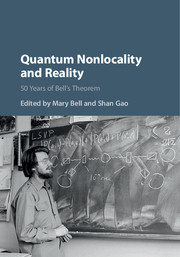Book contents
- Frontmatter
- Contents
- Contributors
- Preface
- Preface
- Part I John Stewart Bell: The Physicist
- Part II Bell's Theorem
- Part III Nonlocality: Illusion or Reality?
- Part IV Nonlocal Realistic Theories
- 19 Local Beables and the Foundations of Physics
- 20 John Bell's Varying Interpretations of Quantum Mechanics: Memories and Comments
- 21 Some Personal Reflections on Quantum Nonlocality and the Contributions of John Bell
- 22 Bell on Bohm
- 23 Interactions and Inequality
- 24 Gravitation and the Noise Needed in Objective Reduction Models
- 25 Towards an Objective Physics of Bell Nonlocality: Palatial Twistor Theory
- 26 Measurement and Macroscopicity: Overcoming Conceptual Imprecision in Quantum Measurement Theory
- Index
- References
26 - Measurement and Macroscopicity: Overcoming Conceptual Imprecision in Quantum Measurement Theory
from Part IV - Nonlocal Realistic Theories
Published online by Cambridge University Press: 05 September 2016
- Frontmatter
- Contents
- Contributors
- Preface
- Preface
- Part I John Stewart Bell: The Physicist
- Part II Bell's Theorem
- Part III Nonlocality: Illusion or Reality?
- Part IV Nonlocal Realistic Theories
- 19 Local Beables and the Foundations of Physics
- 20 John Bell's Varying Interpretations of Quantum Mechanics: Memories and Comments
- 21 Some Personal Reflections on Quantum Nonlocality and the Contributions of John Bell
- 22 Bell on Bohm
- 23 Interactions and Inequality
- 24 Gravitation and the Noise Needed in Objective Reduction Models
- 25 Towards an Objective Physics of Bell Nonlocality: Palatial Twistor Theory
- 26 Measurement and Macroscopicity: Overcoming Conceptual Imprecision in Quantum Measurement Theory
- Index
- References
Summary
Introduction
John S. Bell, of course, is best known for the result now referred to simply as “Bell's theorem,” which removed from consideration the class of so-called local hidden-variable theories that at the time of its publishing appeared to be the most natural class of theories among those that would render quantum mechanics a form of statistical mechanics. If, as this and other results suggest, quantum theory is to serve as a truly fundamental theory, conceptual precision in its interpretation is not only desirable but paramount. John Bell was accordingly concerned about what he viewed as conceptual imprecision, from the physical point of view, within the standard approaches to the theory. He saw this as most acute in the case of their treatment of measurement at the level of principle. His concerns were strongly expressed in the article “Against measurement” [1]. This was published in 1990 in a volume of proceedings of the 1989 Erice meeting “Sixty-Two Years of Uncertainty,” during which it was my pleasure to meet and eat with Bell, and to listen to him present this paper. He pointed out that this conceptual imprecision is reflected in the terminology of the foundations of quantum theory, a great deal of which he explicitly deemed worthy of banishment from discussions of principle, because it corresponds to a set of what he saw as vague and, in some instances, outright destructive concepts. His concern was thus not one regarding mathematics so much as regarding basic concepts used in contemporary quantum physics, which he viewed as failing the needs of natural philosophy and so of fundamental physics, despite their practical adequacy. Here, I consider John Bell's critique of standard quantum measurement theory and some alternative treatments wherein he saw greater conceptual precision, and make further suggestions as to how to improve conceptual precision, as he advocated.
That the source of difficulties is to be understood specifically as a problem of imprecision of physical concepts that stands in the way of the achievement of an exact fundamental mechanical theory is pointed out at the outset of “Against measurement”: Bell wished to make it clear “at once that it is not mathematical precision, but physical” that caused him such great concern.
- Type
- Chapter
- Information
- Quantum Nonlocality and Reality50 Years of Bell's Theorem, pp. 419 - 437Publisher: Cambridge University PressPrint publication year: 2016

